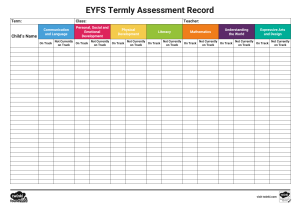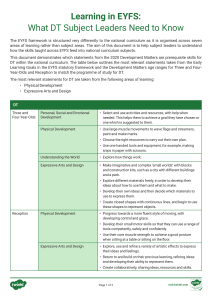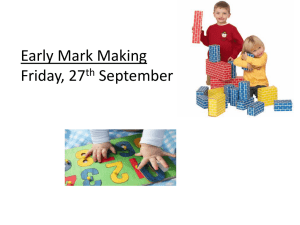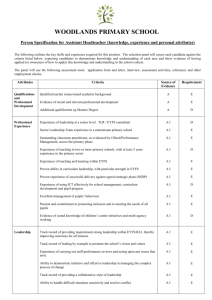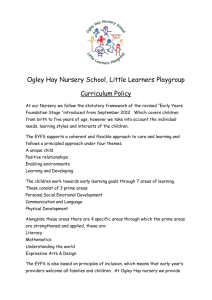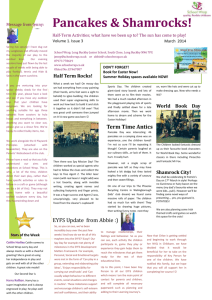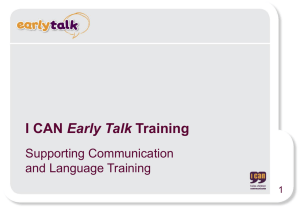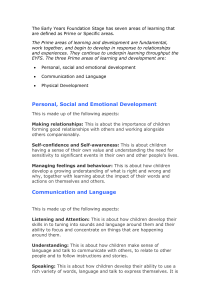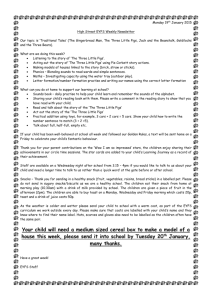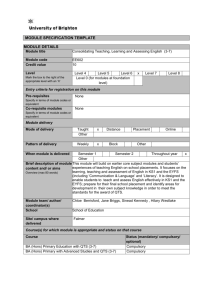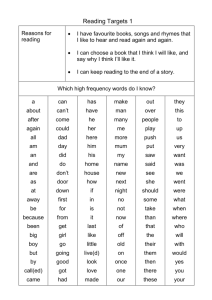EYFS curriculum
advertisement
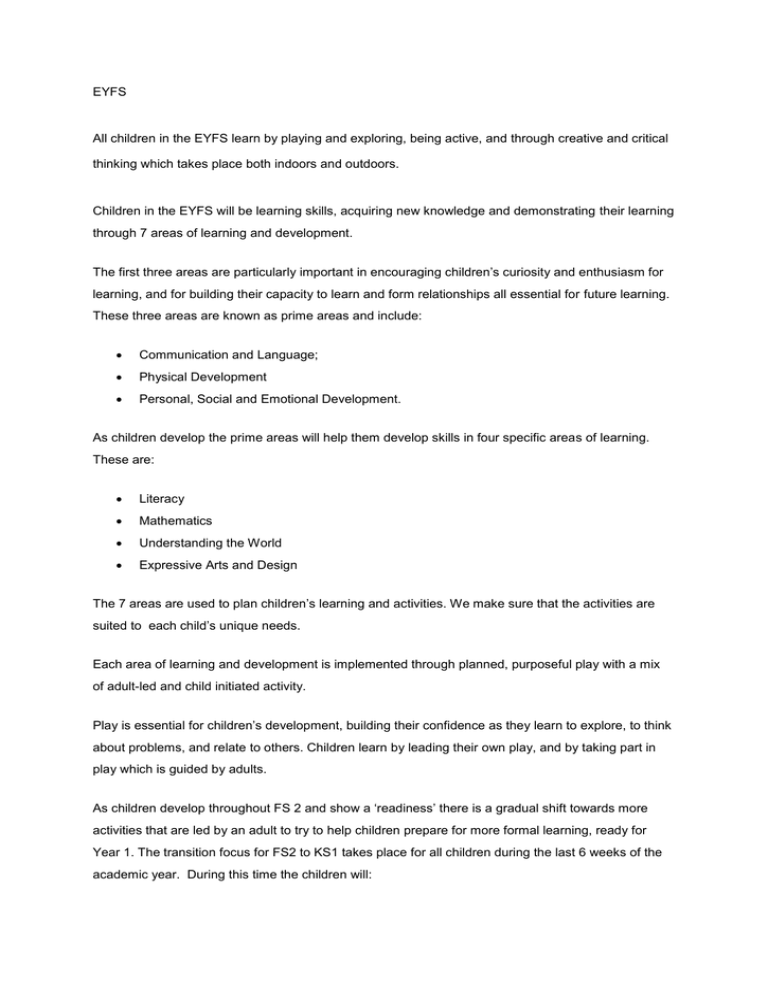
EYFS All children in the EYFS learn by playing and exploring, being active, and through creative and critical thinking which takes place both indoors and outdoors. Children in the EYFS will be learning skills, acquiring new knowledge and demonstrating their learning through 7 areas of learning and development. The first three areas are particularly important in encouraging children’s curiosity and enthusiasm for learning, and for building their capacity to learn and form relationships all essential for future learning. These three areas are known as prime areas and include: Communication and Language; Physical Development Personal, Social and Emotional Development. As children develop the prime areas will help them develop skills in four specific areas of learning. These are: Literacy Mathematics Understanding the World Expressive Arts and Design The 7 areas are used to plan children’s learning and activities. We make sure that the activities are suited to each child’s unique needs. Each area of learning and development is implemented through planned, purposeful play with a mix of adult-led and child initiated activity. Play is essential for children’s development, building their confidence as they learn to explore, to think about problems, and relate to others. Children learn by leading their own play, and by taking part in play which is guided by adults. As children develop throughout FS 2 and show a ‘readiness’ there is a gradual shift towards more activities that are led by an adult to try to help children prepare for more formal learning, ready for Year 1. The transition focus for FS2 to KS1 takes place for all children during the last 6 weeks of the academic year. During this time the children will: Visit the KS1 area and year 1 classrooms Take a tour of the school Enjoy story time with their new teacher and LSA Engage in some mathematical investigations Explore the playground and take part in the activities Communication and Language Communication and language consists of three aspects: Listening and Attention Understanding Speaking. Through adult support and planned activities children are encouraged to become communicators, learning to listen and express themselves. They are supported to extend their vocabulary and will experience stories, songs, poems and rhymes. They are encouraged to take part in role-play and use talk to clarify their thinking. They will learn to distinguish between sounds including letter sounds ready to support learning to read and write. The children will take part in an initiative surrounding oracy and reading. They will work with a teacher three times a week in a small group to develop their comprehension of stories through oral dialogue, reading 1:1 and activities based on the phonic phase they are working within. These sessions will be led by a teacher and take place in our building called ‘Chatter Cottage’. Physical Development Physical development consists of two aspects: Moving and Handling Health and Self-care. Opportunities are provided for children to be active and interactive; and to develop their co-ordination, control and movement both indoors and outdoors. Children learn to move with confidence, imagination and safety. Opportunities are provided for children to develop their fine motor skills that are needed in order to use pens, scissors and tools effectively. Planned PE sessions in the hall or playground help children to develop their gross motor skills for example by climbing, balancing, throwing, catching and negotiating space. They learn the importance of keeping healthy and the factors that contribute to a healthy lifestyle. They will observe the effect that exercise has on their bodies. This year we are also covering areas of learning from Literacy, Mathematics and Communication and Language within Physical Development. For example, the children take part in Physical Phonics. This involves finding letters that are place around an assault course and working as a team to use phonic knowledge and skills to create words and sentences. Personal, Social and Emotional Development Personal, social and emotional development consists of three aspects: Making Relationships Self-confidence Self-awareness Managing Feelings and Behaviour Within a nurturing environment children are helped to develop a positive image of themselves, and others; to form positive relationships and develop respect for others. They are helped to develop social skills and to manage their feelings and behaviour. They learn to understand appropriate behaviour in groups; and to have confidence in their own abilities. Through activities and conversations children are encouraged to express their ideas and feelings and to develop strategies to cope with new, challenging or stressful situations. We provide a range of positive images and experiences that help them embrace and accept differences in gender, ethnicity, language, religion, culture, special educational needs and disabilities. Literacy Literacy consists of two aspects: Reading Writing. Children are given access to a wide range of reading materials including books, poems and other written materials. They are helped to recognise that print carries meaning. Through a range of activities and classroom labels, signs and notices children develop an understanding of the relationship between the spoken and written word. . Children are encouraged to link sounds and letters through daily teaching sessions. They are taught letter formation and how to use their letter sound knowledge to begin to read and write. Mathematics Mathematics consists of two aspects: Numbers and Shape Space and Measures Children are given opportunities to develop and improve their skills in counting, understanding and using numbers, calculating simple addition and subtraction problems; and to describe and compare shapes, spaces and measures using appropriate mathematical language. Understanding the World Understanding the World consists of three aspects: People and Communities The World Technology. Children are helped to make sense of their physical world and their community through opportunities to explore, observe and to find out about people, places, technology and the environment. Children are helped to find out about past and present events. Opportunities are given to help children deepen their knowledge of their own and other people’s cultures in order to celebrate the similarities and differences. Children are given opportunities to investigate objects and materials looking at their properties. They learn about change, patterns, similarities and differences and to question how and why things work. They have the opportunity to construct with a range of tools, materials and techniques. They explore the natural world and their local environment and are encouraged to express what they like or dislike. They learn how to use appropriate information technology such as computers and programmable toys to support their learning. ICT Children are surrounded by technology and we believe it is vital they recognize the importance it has in their lives from an early stage. At Cardwell, ICT is used across all the areas of learning and we give children the chance to play with and explore a variety of technology and tools. It is worth remembering that ICT is not just a computer, but could be anything from listening to recorded stories, drawing images on an interactive whiteboard or recording sounds – the possibilities are endless. Forest School Children attend our on-site Forest School each week. Forest School encompasses a range of outdoor activities from arts and crafts, team building, wildlife conservation, imaginative activities, physical play, construction and natural exploration. Forest School encourages the development of the children’s emotional and physical development through outdoor play, activities and exploration in an outdoor classroom. In each session, the children will participate in a variety of self-chosen activities with time for free play and exploration. Sessions are led by our qualified Forest School Leader. When appropriate, groups will be taught to use a variety of tools. All activities are risk assessed and can be tailored to meet children’s requirements. Having time regularly in nature is a wonderful chance for children to connect with the environment. All the activities take into account children’s different learning styles and together help to build selfesteem, communication skills, independence and self-confidence. Expressive Arts and Design Expressive arts and design consists of two aspects: Exploring and Using Media and Materials Being Imaginative. Children are given the opportunity to play and explore with a wide range of media and materials. They are given the opportunity and encouragement to share their thoughts, ideas and feelings through a variety of activities in art, music, movement, dance, role-play and design technology. If you would like to know more about our EYFS please contact Tracy Mulhere who is the EYFS Leader
